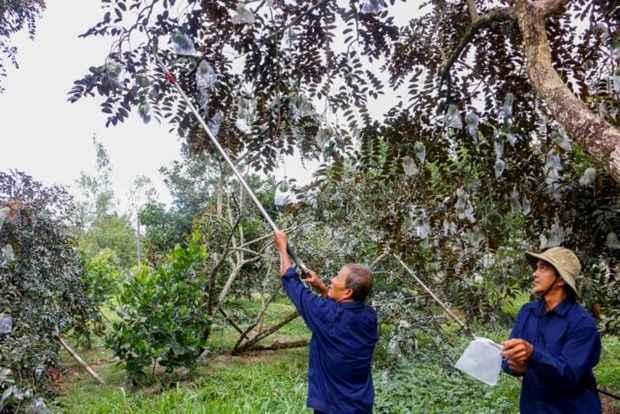Rice farmers switch to high-value crops
More rice farmers in Can Tho city have switched to other crops or have rotated the cultivation of rice with other crops to increase income and cope with drought.
 Farmers of Truong Khuong A Commune Co-operative in Can Tho city use bags to protect young star apples from pests (Photo: VNA)
Farmers of Truong Khuong A Commune Co-operative in Can Tho city use bags to protect young star apples from pests (Photo: VNA)Can Tho (VNS/VNA) - More rice farmers in Can Tho city have switched to other crops or have rotated the cultivation of rice with other crops to increase income and cope with drought.
Farmer Tran Ngoc Thoi in O Mon district’s Truong Lac ward, for example, turned his 1ha of rice field to Ido longan two years ago.
He harvested longan early this year and had a yield of 8.8 tonnes, with a profit of 200 million VND (8,600 USD) from the first crop. Profits from longan are three times higher than from rice, he said.
Most rice fields in Truong Lac ward had switched to high-value fruit like durian, longan and jackfruit, he said.
Other farmers in the Cuu Long (Mekong) Delta city rotated the cultivation of rice and other short-term crops to save irrigation water.
Le Thanh Phong, who owns 2.1ha of rice field in Thot Not district’s Thuan An ward, said he would switch to sesame and watermelon for the summer-autumn crop because of prolonged hot weather and the high location of his field.
In last year’s summer-autumn crop, he grew 0.6ha of sesame and earned a high profit of 35 million VND (1,500 USD) a crop.
Thot Not is estimated to have 580ha of sesame and vegetables this year, up 50ha against last year, according to the district’s Economic Bureau.
Nguyen Thi Mai, deputy head of the bureau, said the district had helped farmers restructure their crops properly to save irrigation water, and adapt to unfavourable conditions. The restructuring would improve income for farmers, she said.
The city last year turned 2,292ha of rice fields into fruit and other crops, according to the city’s Department of Agriculture and Rural Development. The profit is two to four times higher than rice.
The city has 19.53ha of fruit and 13,249ha of vegetables, up 6.8 percent and 7 percent, respectively, against 2018.
Many farmers in the city have also developed urban agriculture and expanded fruit orchards that offer tourism services. The city has 37 fruit orchards that offer tourism services, mostly in Phong Dien, Cai Rang and Thot Not districts. They grow mostly durian, mango, milk apple and rambutan.
The city has encouraged farmers to restructure their crops toward increasing value and quality for sustainable agriculture.
It has also encouraged farmers to join cooperatives or cooperative groups, which can work with companies that can guarantee outlets for farmers.
Truong Van Kiem, deputy head of the Can Tho Cooperative Alliance, said that under the collective farming model, farmers were supplied quality plant seeds and breeding animals, and provided cultivation techniques and disease prevention and control methods.
“Most participating farmers have stable guaranteed outlets so they are not reducing prices to traders.”/.













